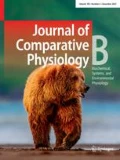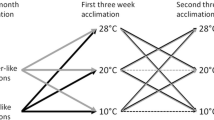Abstract
During seasonal acclimation, Djungarian hamsters spontaneously exhibit a reduction in food intake, body mass and body fat stores, which is externally cued by shortening of day length in autumn and controlled by a sliding set-point. We investigated the function of the leptin adipostatic feedback system in the photoperiodic control of seasonal acclimation. In response to mouse recombinant leptin injections for 10 days, long day photoperiod (LD) and short day photoperiod (SD)-acclimated hamsters decreased food intake and body mass. The reduction of body mass was due to the depletion of body fat, as revealed by carcass composition analysis. In SD hamsters, leptin caused a larger reduction of body fat mass than observed under LD conditions, whereas the anorectic effect was similar in both photoperiods. The serum leptin concentration was 9.3 ± 1.2 ng/ml in LD-acclimated hamsters and decreased significantly to 4.2 ± 0.8 ng/ml and 2.1 ± 0.6 ng/ml in hamsters exposed to SD for 66 days and 116 days, respectively (P < 0.001). A strong positive correlation between total body fat mass and serum leptin concentration was found (r S=0.935, P < 0.0001, n=70). Despite the anorectic action of exogenous leptin, higher endogenous leptin levels in LD hamsters were paralleled by higher food intake in LD hamsters as compared to SD hamsters. This paradoxical finding further supports the increased leptin sensitivity in SD hamsters as judged from leptin treatment experiments. We tested the functional significance of leptin for the controlled down-regulation of food intake and body mass induced by short photoperiod. Food restriction for 10 days during the transition phase decreased body mass below the desired sliding set-point, which was recovered in control hamsters following ad libitum refeeding. Treatment with mouse recombinant leptin during ad libitum refeeding inhibited the recovery of body mass and blunted the increase of food intake observed in controls, indicating that the sliding set-point utilizes leptin as a signal for the adjustment of the appropriate body mass level.
Similar content being viewed by others
Author information
Authors and Affiliations
Additional information
Accepted: 15 October 1999
Rights and permissions
About this article
Cite this article
Klingenspor, M., Niggemann, H. & Heldmaier, G. Modulation of leptin sensitivity by short photoperiod acclimation in the Djungarian hamster, Phodopus sungorus . J Comp Physiol B 170, 37–43 (2000). https://doi.org/10.1007/s003600050005
Issue Date:
DOI: https://doi.org/10.1007/s003600050005




